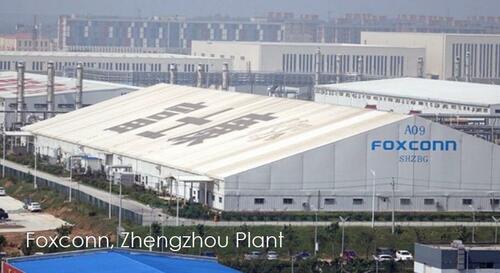World’s Largest iPhone Factory In China Imposes Health Restrictions After Covid Flare-Up
The world’s largest iPhone factory in the central Chinese city of Zhengzhou imposed Covid-19 restrictions at the plant for hundreds of thousands of workers. This comes as China has been grappling with a Covid resurgence in recent weeks.
Foxconn’s Zhengzhou campus has about 300,000 workers — all have been banned from eating in public and must take meals back to their dorms for consumption, the South China Morning Post reported, citing a notice on the factory’s official WeChat account.
“Foxconn’s Zhengzhou workers are only permitted to commute along certain routes within the campus, with many entrances closed in a de facto lockdown,” SCMP said. In another notice, workers living off campus were advised to move into on-site dormitories.
At least for now, production of iPhones at the Zhengzhou campus remains normal despite the newly enacted Covid restrictions, according to a Foxconn spokesman.
“Production in the Zhengzhou campus remains normal, without a notable impact [from the Covid-19] situation,” the spokesman said.
China has yet to capitulate on its long-standing Zero-Covid policy (despite being a convenient scapegoat for Xi to deflect anger at the slowing economy during this month’s 20th party Congress). More than one million people were ordered to stay at home this week in the metro area surrounding the iPhone campus.
The new measures come as the demand for the new iPhone appears to have worsened. The Information reported earlier this week that Apple slashed iPhone 14 Plus production less than two weeks after its debut.
SCMP said increasing infections of Covid are forcing some companies to embrace so-called “closed loop” systems, where workers live on campus and are prohibited from physical contact with the outside world – including family members.
Zero-Covid has dragged growth of the world’s second-largest economy and roiled global supply chains. The good news is the reverse bullwhip effect has left US retailers with large inventories, forcing container lines to slash sails as US importers reduce shipments from Asia.
Tyler Durden
Fri, 10/21/2022 – 06:55

